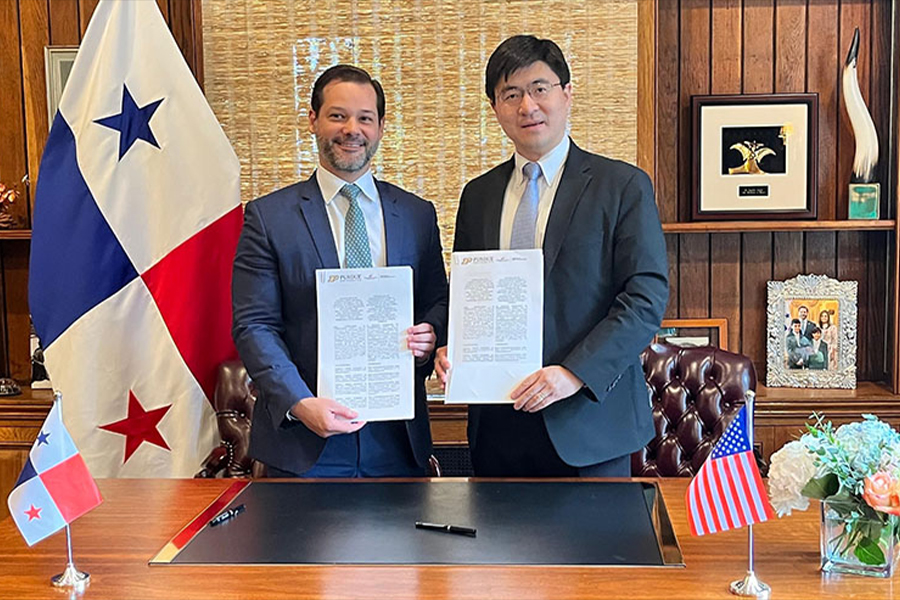Purdue and the nation of Panama signed a memorandum of understanding that promotes scientific and academic cooperation related to emerging technologies, including semiconductors. The agreement was signed by Purdue President Mung Chiang and Ramon Martinez de la Guardia, ambassador of Panama to the U.S.

Purdue and the nation of Panama signed a memorandum of understanding that promotes scientific and academic cooperation related to emerging technologies, including semiconductors. The agreement was signed by Purdue President Mung Chiang and Ramón Martínez de la Guardia, ambassador of Panama to the U.S. (Photo provided by the Embassy of Panama in the U.S.)
Purdue University and the country of Panama have signed a memorandum of understanding (MOU) to enhance educational opportunities and workforce development, placing special emphasis on developing and strengthening the Central American nation’s semiconductor industry. The MOU also seeks to create training programs, research opportunities and academic exchanges in critical areas, including cybersecurity, supply chain management, emerging technologies and other fields relevant to the training and development of Panama’s workforce.
Purdue President Mung Chiang signed the strategic agreement with Ramón E. Martínez de la Guardia, Panama’s ambassador to the U.S., in a ceremony held at the Panamanian embassy in Washington, D.C.Chiang said, “At Purdue University, we are proud to collaborate with the Republic of Panama on this key initiative, advancing innovation and educational cooperation in emerging technologies and strategic supply chains, especially in semiconductors. This MOU underscores Purdue’s strength as America’s leading university in semiconductors, recognized for our trailblazing workforce development efforts, cutting-edge research and growing global partnerships with like-minded partners. Following U.S. Secretary of Commerce Raimondo’s engagement with the Republic of Panama last year, we enthusiastically look forward to this collaboration as America continues the execution of the 2022 CHIPS and Science Act.”
In addition to the signed MOU, Purdue and Panama agreed to collaborate on future agreements that would provide students in Panama with access to Purdue programs in advanced disciplines.
The partners also said they will explore the feasibility of establishing a Global Workforce Development Center for Advanced Technology in Panama to support regional efforts in semiconductors, cybersecurity and other emerging technologies.
“Together with Purdue University, we aim to cultivate an innovative ecosystem that will drive economic and human resource development while positioning Panama as a regional leader in technology and semiconductor advancements,” said José Alejandro Rojas, Panamanian minister counselor for private investment. “As a proud Panamanian and Purdue University alum, I am thrilled about the strategic alliance forged between our government and Purdue University. This MOU marks a significant milestone in our commitment to fostering the growth of the semiconductor, cybersecurity and other technological sectors in Panama.”
Last July the U.S. State Department announced that it will collaborate with the Panamanian government and other like-minded partner nations to explore opportunities to diversify and grow the global semiconductor ecosystem. The partnership was enabled by the International Technology Security and Innovation Fund, created as part of the CHIPS and Science Act.
Panama joins an expanding list of countries that are attempting to grow their semiconductor industry. In April the Panamanian government launched a national initiative to develop and promote microelectronics and semiconductor activities. The alliance with Purdue will help bolster those efforts through academic collaboration and workforce development.
“There’s a universal realization that chips and semiconductor technology are fundamental to human progress, and it will take a global alliance to ensure the semiconductor supply chain is stable. Perhaps the most important supply chain to secure is human talent,” said Vijay Raghunathan, Purdue’s vice president for global partnerships and programs and the director of semiconductor education. “Purdue is committed to foster international collaborations as we look to strengthen scientific progress and drive global economic and technological resilience.”
International partnerships have become a hallmark of excellence for Purdue. Since the beginning of 2024, the university has forged agreements with multiple academic, government and industry partners, including South Korea-based semiconductor and memory chip maker SK hynix; Dassault Systèmes, a multinational software giant providing virtual twin experiences for global industries; and Lam Research, a manufacturer of wafer fabrication equipment for the semiconductor industry.
Source: Purdue, Panama enter agreement to support semiconductor academic collaboration and workforce development
